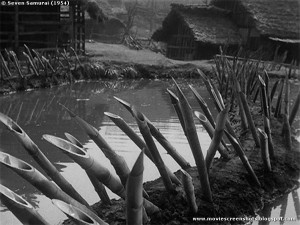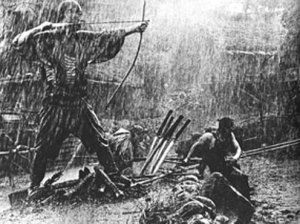Blog Archives
Golden Token: Seven Samurai
I was talking with a friend of mine a couple of days ago, and he was telling me that he just saw Akira Kurosawa’s Rashomon, and that I should do a review of it. I replied by saying that among Kurosawa’s films, Rashomon would actually be my 3rd or 4th favorite, depending on my mood. My favorite Kurosawa film would have to be Seven Samurai. This is the classic story of 7 Ronin, (Samurai Warriors who no longer have masters and therefore act as “hired guns” so to speak), who are hired by a poor village in order to protect it from bandits. In facing these difficult odds, the warriors fight for more than money, they defend the small village for honor.
Let me tell you the number one reason why I love this movie. Oddly enough, its the same reason why most Japanese people aren’t fans of Akira Kurosawa. Seven Samurai, like many of Kurosawa’s films at the time, was based on Western film.
Reasons to Watch:
1) Its a Western.
Akira Kurosawa took the concept of the Hollywood Western, those cowboy and indian movies that came out of Hollywood in the 20’s, 30’s and 40’s. When I said the Ronin were “hired guns” I meant it. This movie took so many of the conventions of Hollywood Westerns and made them into something that Japanese movies take as conventions.
Have you ever seen one of those fights in the anime Rorouni Kenshi (Samurai X) where two swordsmen would stand face-to-face, suddenly run at each other then slash at each other, then they both stand facing the opposite directions and after a few seconds one guy spurts out blood and collapses on the floor? Yeah, Kurosawa started that, with this clip right here.
Sorry I could only find it in Italian, so check it out. Yes, by today’s action standards this may be slow, but this scene was all about the tension. Two men standing face-to-face. The tension builds as they stare each other for minutes. One person flinches the other reacts and at the end, and with split-second reflexes one person is down and the battle is over. That formula sounds kind of familiar, no?
Yup. The samurai fight scenes we all know and love originated from the now movie cliche of Western Quick Draw showdowns. Bet you didn’t see that one coming. It is that kind of innovation that makes me love Akira Kurosawa. He took a film style that was purely associated with the US and brought it over Japan, and gave it its own flare.
There were times when the bandits would ride their horses along the countryside and forests of Japan, and the camera would shoot them riding, tracking them as they ran sideways. Most films at the time would have shot this scene far enough away to see the whole horse and rider, Kurosawa zoomed in to the lead rider and horse, framing their heads in the same shot. Again from the Western.
In fact, the guy was so good at making a Western, that his movie, Seven Samurai, was remade into one of the best American Westerns ever, The Magnificent Seven, which boasted an all-star Western cast led by Yul Brenner, Steve McQueen, Eli Wallach and Charles Bronson. That is one hell of a praiseworthy accomplishment if you ask me.
2) Camera work and editing
Believe it or not, before being used in the clip above, slow-motion was rarely ever seen in film. I doubt that Akira Kurosawa invented it, but he is definitely one of the pioneers of that effect that we all take for granted. He timed it perfectly in that duel and it worked well emotionally as the one man fell slowly to the ground. If anything the use of slow-motion in any action scene can find its roots somehow to this film and Kurosawa’s use of it. So I give him tremendous credit for that.

When you don't have digital video, you become a lot more meticulous about what you shoot. This is pretty beautiful.
If that weren’t enough, Kurosawa had some amazing framing in his shots. The scenes were beautifully composed. I loved how the whole movie looked. Black and white film creates an amazing sight on screen. It isn’t as detailed to the point of HD cameras where we could see the blemishes and wrinkles on the faces of actors like we do now, yet there is a sharp crispness to the light and shadow, which gives the film a dramatic flair and allows things to pop out despite lacking in color. That being said, when used well, black & white film can make for very artistic shots. And they were used pretty well here.
Kurosawa had an awesome eye for composition. His shots are something to look at. There’s rarely any wasted angles and dead shots. He didn’t waste any film on shots that were less than excellent, and he had an eye for perfection that is still amazing by today’s standard. This is characteristic of a lot of his films, so I won’t say this is uniquely Seven Samurai, but it still is one of the reasons you have to see this movie.
Also, this movie ends with one of the most beautiful, memorable shots I have ever seen.
3) The emotional power
The acting performances partnered with the cinematography and soundtrack (as well as the lack thereof) created many eerily powerful moments. The movie’s stark lack of sound on some occasion brought out a raw stillness of heightened anticipation that is lost to most people now that we live in this information age. But if you can find the patience in you to watch it, these relatively still moments say much more than you would imagine.
The actors were very interesting to watch. They breathed very different personalities into each of their characters, and you could distinctly tell them apart. This was all the more an achievement since they didn’t really have colorful costumes to do the work for them. That’s the problem with a lot of movies today, they take for granted the importance of acting and personality. Key example, Street Fighter. The people that made the movie just relied on the costumes to differentiate the characters, and people like Ryu and Ken had their characters dragged through the dirt because of paper-thin personalities. Okay, I know its Street Fighter, but I was just illustrating a point.
For a more serious example, take King Arthur, the movie starring Clive Owen. He brought a band of his Roman Knights to Britain, and well, they were generally boring individuals. They didn’t have much character to speak of, and apart from fighting styles and costumes, they didn’t have much to differentiate themselves from one another. This makes all the difference for when one of them dies, because you don’t feel much attachment to any of them outside of the privileged few given more screen time. Its amazing how a film made over 50 years ago could still evoke more emotion and strength than one that came out within the last decade.
This film, more than anything had themes of honor, courage, trust, faith and teamwork, and it did them beautifully. I may have said this before, but I think it deserves to be said again. Hollywood is the pinnacle of technical achievement. The Hollywood system has developed over the years to become a great scientific and technical machine. From the likes of Alfred Hitchcock to Steven Spielberg, directors have studied knowledge of how this shot and song would evoke this kind of action.
Yet in the midst of this technical mastery, they have never developed a sense of raw emotion that you would find in European and Asian Cinema. Whereas Hollywood is a feast for the eyes and mind, many European and Asian movies are a feast of the heart. (this doesn’t count for everything of course, I just mean in general) Asia, even more so, builds really good emotion, partly, in my honest opinion, because there’s a lot more gut feel involved. In Seven Samurai, the values, the emotions are powerfully translated on the screen. The film as a whole just drives these themes into your head in such a way that its really strong and yet not overbearing. I apologize if I’m a bit vague, something like that isn’t easy to put into words. You should check it out for yourself to get what I mean.
Final Word:
What else can I say? Seven Samurai is amazing. Its one of the greatest examples of how film can transcend borders. Akira Kurosawa is heralded in international circles as one of the greatest film makers of all-time and this movie is proof of why. Its just one entry in Kurosawa’s legendary filmography, and I wouldn’t deserve my title as a resident film geek if I didn’t recommend this movie to you. It certainly isn’t a movie you can casually pop in, for that, I have a ton of other things I’d recommend. But if you have the stomach for it, and you’re ready for it, I dare you to watch it and then truthfully tell me that it isn’t one of the best films you’ve ever seen.


